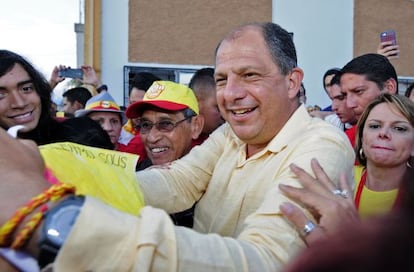Costa Ricans vote overwhelmingly for liberal party candidate
Voters punish outgoing President Chinchilla for her economic policies

Opposition candidate Luis Guillermo Solís won Sunday’s presidential election in Costa Rica after voters swept in the Citizens Action Party (PAC) for the first time in the country’s history.
With 96 percent of the ballots counted, Solís captured 77.8 percent of the vote compared to Johnny Araya of the ruling National Liberation Party (PLN), who received 22 percent in this runoff race.
The 53-year-old Solís, a political novice who has never held public office, campaigned with a pledge to turn around Costa Rica’s faltering economy, including modifying the free-trade accords with the United States that are currently in place.
Voter abstention was placed at 43.6 percent – the highest in Costa Rican history
Thousands of his supporters gathered to cheer on Solís at a soccer stadium in San Jose’s Monte de Oca district, just east of the capital.
Araya officially bowed out of the race last month after losing support in the polls and finding himself unable to come up with enough money for his bid. But the PLN continued to campaign for its candidates and Araya publicly urged voters on Sunday to go to the polls. Nevertheless, voter abstention was placed at 43.6 percent – the highest in Costa Rican history – compared to the 31.8 percent during the first round on February 2.
Solís, who until December worked as a political science professor at the University of Costa Rica, takes over on May 8 from President Laura Chinchilla, whose conservative PLN administration had come under fire for failing to deal with high unemployment and corruption allegations lodged against some of her party members.
Over the past few months, Solís, a populist centrist, pledged to keep Costa Rica’s open economy and was willing to bring in more foreign investment to the Central American nation while at the same time introducing measures aimed at resolving social inequalities.
With a public deficit of more than five percent, many economists believe that the country is in dire need of an exhaustive tax reform. But Solís said he won’t introduce any tax restructuring in this four-year term in office and has also pledged for more investment for public works projects.
The Supreme Election Tribunal (TSE) declared the PAC candidate the winner just two hours after the polls closed, putting an end to two consecutive PLN administrations and the traditional two-party rule system of government that had been in place for decades.
Tu suscripción se está usando en otro dispositivo
¿Quieres añadir otro usuario a tu suscripción?
Si continúas leyendo en este dispositivo, no se podrá leer en el otro.
FlechaTu suscripción se está usando en otro dispositivo y solo puedes acceder a EL PAÍS desde un dispositivo a la vez.
Si quieres compartir tu cuenta, cambia tu suscripción a la modalidad Premium, así podrás añadir otro usuario. Cada uno accederá con su propia cuenta de email, lo que os permitirá personalizar vuestra experiencia en EL PAÍS.
¿Tienes una suscripción de empresa? Accede aquí para contratar más cuentas.
En el caso de no saber quién está usando tu cuenta, te recomendamos cambiar tu contraseña aquí.
Si decides continuar compartiendo tu cuenta, este mensaje se mostrará en tu dispositivo y en el de la otra persona que está usando tu cuenta de forma indefinida, afectando a tu experiencia de lectura. Puedes consultar aquí los términos y condiciones de la suscripción digital.








































